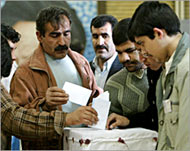Conservatives set for Iran poll landslide
Voting has closed in Iran’s controversial legislative election with conservatives set for a sweeping victory following a boycott by reformists.

What is revealed from the mountain of paper ballots – possibly on Saturday – may determine the credibility of the reform movement and its drive to make the all-powerful theocracy more accountable to elected officials and the public.
Reformers – outraged by the banning of more than 2400 candidates – hoped for a widespread snub of the voting to take a needed moral victory and humble the leadership just a week after the 25th anniversary of the Islamic Revolution.
Aljazeera’s correspondent in Tehran reported broad participation in the south of Iran which is loyal to the conservatives.
“Many participants in a number of rural areas attended the voting centres. In Khuzestan and Shiraz, Arabs are strongly participating while participation in other areas like Blushstan and Kurdistan is medium or weak. Analysts are optimistic that turnout may reach 50%,” he said.
“It is expected that the preliminary results might be announced on Saturday while the final results will be announced some days later”, he added.
Tussle
Blocked from the mainstream media to reach voters, liberals turned to technology. They fired off pro-boycott e-mails and mobile phone messages to millions of people.
“Don’t take part in the funeral of freedom,” said one text message.
But the conservative establishment fought back hard.
It pulled out all the stops – led by non stop appeals and programmes on state television and radio – and claimed a big turnout buried the boycott effort. A significant turnout would give the clerics’ little reason to make democratic concessions.
“You see how those who are against the Iranian nation and the revolution are trying so hard to prevent people from going to the polls,” said Iran’s supreme leader, Ayat Allah Ali Khamenei, the regime’s highest religious and political authority.
Candidate crisis
The candidate ban by a Khamenei-appointed panel left fewer than 250 veteran reformers among nearly 4500 candidates and provoked one of Iran’s most serious political crises in decades.
 |
|
Conservatives are hoping a high |
It means that the 290-seat parliament, or majlis, will likely return to the control of lawmakers loyal to – or at least tolerant of – the unelected clerics who say their rule is divinely inspired.
The immediate significance would be an end to the ideological clashes that have paralysed the chamber since the reformists’ landslide in 2000 gave them a two-thirds majority.
Parliament has little legislative power since all key measures need approval from the appointed conservative clerics. But the new lawmakers could have a free hand to pass budgets that support conservative factions and outlets, such as state broadcasting.
Sensitive time
It also would consolidate hard-line control at a sensitive time. In Iraq, fellow Shia Muslims are pressing for early elections and look to Iran for backing. Washington and it allies, meanwhile, are questioning Iran’s denials about seeking nuclear arms technology.
“It’s religious fascism,” said Hamidreza Jalaeipour, a columnist for Yas-e-nu – one of two pro-reform newspapers banned earlier this week.
The conservatives were just as blunt about boycott backers.
“They are traitors to Islam and the country,” Ayat Allah Ahmad Jannati told worshippers at Friday prayers at Tehran University. Jannati leads the powerful Guardian Council, which banned the pro-reform candidates.
The former champion of the reformers – President Muhammad Khatami – was stoned-faced as he cast his ballot and conceded: “Whatever the result of the elections, we must accept it.”
Reformers have indicated they could claim success by trimming national turnout to about 40% and lower in urban strongholds such as the capital, Tehran.
Parliamentary elections in 2000 attracted 67.2% of voters nationwide and 46.9% in Tehran province.